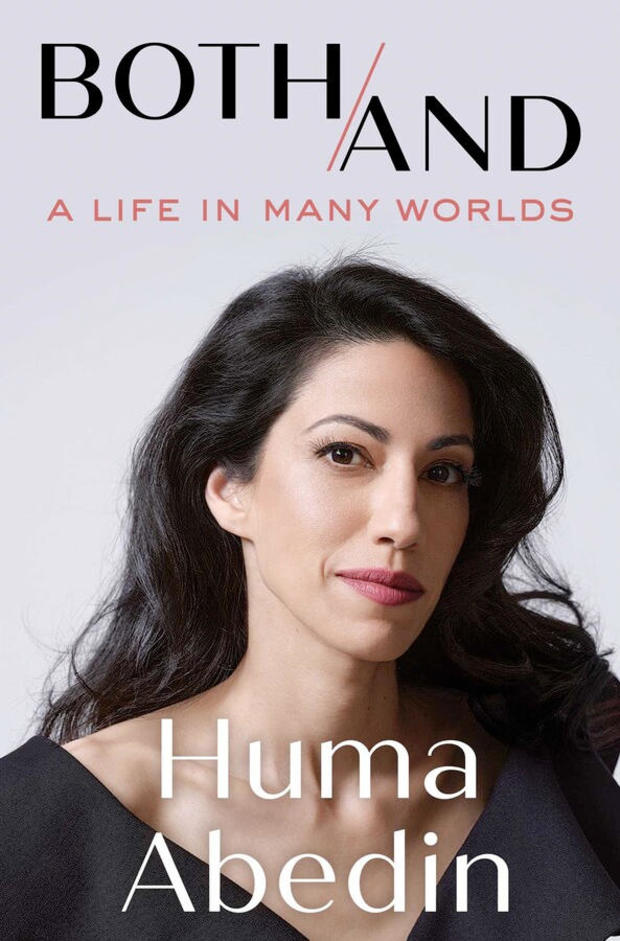In her memoir, "Both/And: A Life in Many Worlds" (published by Scribner, an imprint of Simon & Schuster, a division of ViacomCBS), Huma Abedin, the longtime aide to Hillary Rodham Clinton, writes about her awakening to the workings of diplomacy, the participation of women in government, and how she found a role for herself at the most famous address in the world.
Read the excerpt below, and don't miss Norah O'Donnell's interview with Huma Abedin on "CBS Sunday Morning" October 31!
In March 1995, in the middle of my sophomore year [at George Washington University], my mom invited me to join her in New York at the preparatory session for the United Nations Fourth World Conference on Women, which would be held in Beijing that September. She needed an assistant to do what I had done for my father on his trips: make travel and hotel bookings, take notes at meetings, and so on. It had been a decade since the last World Conference on Women, and it sounded like some bureaucratic exercise. My mother's generation had struggled and fought for progress. Wasn't mine the one poised to reap the benefits? I assumed I could do anything I wanted, especially after leaving Saudi Arabia and coming to America. I didn't see it as revolutionary for women to meet to demand the very basic things that I now took for granted.
Yet I was awed the moment I stepped into the lobby of the United Nations, its grand entry hall flooded with natural light from a tall floor-to-ceiling wall of windows. The whole building was teeming with thousands of women. Turn this way and they were speaking Spanish; turn that way and they were speaking Dutch, and French, and Arabic. It felt like a place where things were happening.
The previous World Conferences on Women had resulted in a living document called "The Draft Platform for Action," about broad, far-reaching goals for the advancement of women, while also detailing specific milestones and benchmarks for each country and region. Delegations had come to New York to propose amendments to the document, and they would convene in different committees to consider and edit them, line by line and word by word. My job was to go with my mom and her nongovernmental organization to all these different meetings and take notes on the changes being made, then input them into the document so she and her colleagues could review them. The changes would ultimately be put to a vote, and the amendments that passed would be included with the final draft platform to be ratified in Beijing.
It was really exciting. Being there gave me a window into how diplomacy works, how countries have to bend their own priorities and negotiate. It was also an eye-opening education in the ways women were still being treated around the world, not just in the developing world but everywhere. At almost every meeting, my mom would remind her colleagues that nothing would change unless we urged men to the table.
Back at GWU, I ran for president of the Pakistani Students' Association after two guys snickered when someone suggested that I would be an ideal candidate to lead our group. I won. Soon after, I invited the Pakistani ambassador, Maleeha Lodhi, to the university, where she gave a major policy speech about American-Pakistani relations. Our group also organized students to lobby Congress. This small taste of diplomacy and politics felt not just exciting but also right. Almost like a beginning.
Over the course of my junior year, I began talking to friends about an internship for my senior year. To apply to graduate school, I needed some kind of work experience and I didn't have any. My friend Roneith Hibbert told me about her incredible internship at the White House, working for President Clinton's press secretary, Mike McCurry. She sat right behind the podium and blue curtain, where all the administration officials would make media appearances. "I think you'd love it and it would be a great opportunity. I'll pick up an application for you."
I had never dreamed of working in the White House, or even in government. I suspected it might be totally beyond my reach. But I still carried the feeling I'd had as I walked around the United Nations building, and I figured, Well, what do I have to lose?
From "Both/And: A Life in Many Worlds" by Huma Abedin. Copyright © 2021 by Huma Abedin. Excerpted with permission by Scribner, a division of Simon & Schuster, Inc.
For more info:
Watch a preview clip of Norah O'Donnell's interview with Huma Abedin below:
Download our Free App
For Breaking News & Analysis Download the Free CBS News app
"Many" - Google News
October 30, 2021 at 10:49PM
https://ift.tt/3mrFvO3
Book excerpt: "Both/And: A Life in Many Worlds" by Huma Abedin - CBS News
"Many" - Google News
https://ift.tt/2QsfYVa
Shoes Man Tutorial
Pos News Update
Meme Update
Korean Entertainment News
Japan News Update
Bagikan Berita Ini















0 Response to "Book excerpt: "Both/And: A Life in Many Worlds" by Huma Abedin - CBS News"
Post a Comment